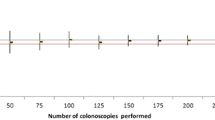Abstract
Background
Current guidelines suggest that a gastroenterology fellow in training needs to perform 140 colonoscopies to achieve competency. Data are limited regarding adenoma detection rate (ADR) in fellowship.
Aims
To assess how fellow ADR correlates with number of colonoscopies performed.
Methods
We performed a retrospective study examining consecutive colonoscopies performed by gastroenterology fellows. Fellow ADR before and after the 140 procedure benchmark was compared to colonoscopies performed by attending only with whom these fellows trained. A threshold for ideal procedure count was performed using ROC analysis.
Results
We analyzed 2021 average-risk colonoscopies performed by 10 gastroenterology fellows under the supervision of an attending physician. When fellows had performed <140 colonoscopies, the ADR was 27 % compared with an ADR of 36 % when fellows had performed >140 colonoscopies under attending supervision (p = 0.02). The ADR of fellows who had performed >140 colonoscopies under attending supervision was greater than that of attending-only colonoscopies (36 vs. 25 %, p < 0.0001). A threshold of >325 (male patients) and 539 (female patients) colonoscopies was determined to be ideal for achieving adequate ADR based on ROC analysis.
Conclusions
Our data suggest that ADR increases after fellows perform >140 colonoscopies under attending supervision, and thereafter surpasses the ADR of attending-only colonoscopies. Some of the differences may be driven by detection of small adenomas. The findings of this study suggest that a higher threshold for number of colonoscopies performed under attending supervision may be needed to achieve adequate ADR during fellowship prior to independent practice.


Similar content being viewed by others
References
Siegel RL, Miller KD, Jemal A. Cancer statistics, 2015. CA Cancer J Clin. 2015;65:5–29.
Kahi CJ, Imperiale TF, Juliar BE, Rex DK. Effect of screening colonoscopy on colorectal cancer incidence and mortality. Clin Gastroenterol Hepatol. 2009;7:770–775.
Kahi CJ, Myers LJ, Slaven JE, et al. Lower endoscopy reduces colorectal cancer incidence in older individuals. Gastroenterology. 2014;146:718-e3–725-e3.
Nishihara R, Wu K, Lochhead P, et al. Long-term colorectal-cancer incidence and mortality after lower endoscopy. N Engl J Med. 2013;369:1095–1105.
Rex DK, Schoenfeld PS, Cohen J, et al. Quality indicators for colonoscopy. Gastrointest Endosc. 2015;81:31–53.
Do A, Weinberg J, Kakkar A, et al. Reliability of adenoma detection rate is based on procedural volume. Gastrointest Endosc. 2013;77:376–380.
Spier BJ, Benson M, Pfau PR, et al. Colonoscopy training in gastroenterology fellowships: determining competence. Gastrointest Endosc. 2009;30:1–6.
Patwardhan VR, Feuerstein JD, Sengupta N, et al. Fellowship colonoscopy training and preparedness for independent gastroenterology practice. J Clin Gastroenterol; 2015.
Rogart JN, Siddiqui UD, Jamidar PA, et al. Fellow involvement may increase adenoma detection rates during colonoscopy. Am J Gastroenterol. 2008;103:2841–2846.
Buchner AM, Shahid MW, Heckman MG, et al. Trainee participation is associated with increased small adenoma detection. Gastrointest Endosc. 2011;73:1223–1231.
Peters SL, Hasan AG, Jacobson NB, Austin GL. Level of fellowship training increases adenoma detection rates. Clin Gastroenterol Hepatol. 2010;8:439–442.
Munroe CA, Lee P, Coplant A, et al. A tandem colonoscopy study of adenoma miss rates during endoscopic training: a venture into uncharted territory. Gastrointest Endosc. 2012;75:561–567.
Butterly LF, Chase MP, Pohl H, Fiarman GS. Prevalence of clinically important histology in small adenomas. Clin Gastroenterol Hepatol. 2006;4:343–348.
Barclay RL, Vicari JJ, Greenlaw RL. Effect of a time-dependent colonoscopic withdrawal protocol on adenoma detection during screening colonoscopy. Clin Gastroenterol Hepatol. 2008;10:1091–1098.
Acknowledgments
There was no grant support for this manuscript.
Author’s contribution
Gianotti and Shah involved in writing. Tapper, Gianotti, Kothari, and Sheth involved in critical revision. Gianotti, Kothari, and Shah involved in data acquisition. Tapper involved in analysis. Shah and Sheth involved in supervision/concept. All authors approved manuscript.
Author information
Authors and Affiliations
Corresponding author
Ethics declarations
Conflicts of interest
None.
Additional information
Robert J. Gianotti and Sveta Shah Oza have contributed equally to this manuscript.
Electronic supplementary material
Below is the link to the electronic supplementary material.
Rights and permissions
About this article
Cite this article
Gianotti, R.J., Oza, S.S., Tapper, E.B. et al. A Longitudinal Study of Adenoma Detection Rate in Gastroenterology Fellowship Training. Dig Dis Sci 61, 2831–2837 (2016). https://doi.org/10.1007/s10620-016-4228-9
Received:
Accepted:
Published:
Issue Date:
DOI: https://doi.org/10.1007/s10620-016-4228-9



